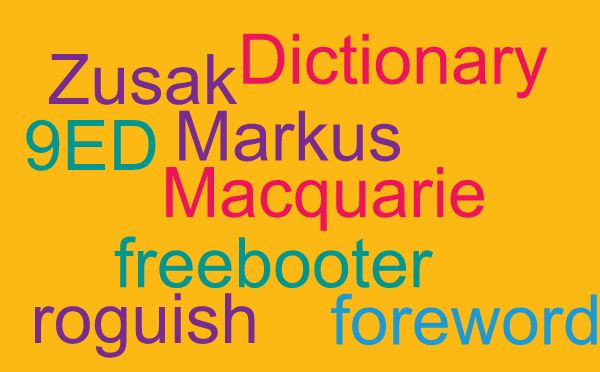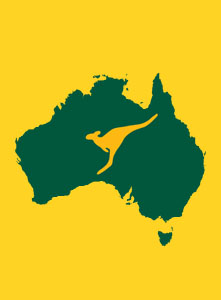The new edition of the Macquarie Dictionary has been introduced by one of our very favourite authors. Markus Zusak is an internationally bestselling author of such beloved novels as The Book Thief, The Messenger and Bridge of Clay. Markus has a deep love of dictionaries, eloquently conveyed in the Foreword of the Ninth Edition of the Macquarie Dictionary, which appears below. Enjoy!
—————–
We all have specific quirks and relationships with certain objects in our lives.
One of mine is with my dictionary.
Every time I consult with it, and due to certain creasings in the spine, it opens to the exact same page. (Sincerest apologies to all you law-abiding, non-spine-breakers out there). But yes – every time! And what’s the word that sits / resides / mocks / glorifies at the top right corner of that page? It’s a word I’ve come to know well from my forays into a writing trade, with that dictionary as my aid and accomplice:
Freebooter.
Its meaning?
A pirate or plunderer.
It stands to reason that every time I open that dictionary, I’m reminded of the impostor syndrome that cripples so many of us when we try to write something, or even read it. What were we thinking when we thought writing a novel was a good idea? What was Joseph Heller thinking when he strung / cajoled / shouted / blasphemed / sprayed countless bullets of words onto all those flummoxing pages of Catch-22? Seriously, it took me a full high-school year and a dictionary to get through it – with a half-time break in between. (Sorry as well to anyone offended by my referring to a great American author in an Australian dictionary’s foreword – but it’s something I’ll never forget, and I don’t want to be too parochial, after all.)
Previous forewords to the Macquarie Dictionary have been penned by Tom Keneally, Kate Grenville and Kim Scott, among other titans of Australian literature. See how I feel like a freebooter? They are all master storytellers, and magicians of the English language in its many Australian leanings. I feel quite certain that they’re not impostors, or marauders for such a job. Or are they? You only need to take one look at the sheer size of the majestic volume in your hands. More likely, it sits on your desk like an anvil, or a leviathan in your lap. Think of that girth of words. (I even imagine some barnacles, too, of words that just won’t shift, reminding you they exist.) In short – who can know them all?
What I love is that every time this Australian edition is updated, new words are duly added, and some become Word of the Year. Does every country do this? In a way I don’t really want to know, because to me it feels uniquely us. Australian culture still has a beautiful, outlandish, roguish, sometimes embarrassing, and always wonderfully audacious sense of play. I like to think we’re also practical enough to consider a dictionary as a toolkit. It’s something to rummage our grubby hands through, to find the right screwdriver, or spanner. After all, we just need something to fix that lousy, pear-shaped sentence. Of course, we can and must admire the English language, in all its unfathomable multitude, but at times we just need it to work. And it can work in mysterious ways.
In my case, I remember my dad lambasting me once, when I wrote a particular sentence in a very particular book. I’d described a certain character as sitting hunch-drunk at her desk. To me it summed her up, as the decades had worn her down between World Wars I and II. In his Austrian-Australian accent, though, my dad had a different opinion. In a phone call punctuated by swearing and alliteration, he said, ‘Why did I bother bloody sending you to bloody school? It’s punch-drunk, you idiot, not hunch-drunk!’
And therein lay the dilemma.
Do I buckle and settle for punch-drunk?
Or do I gamble and stick with the original thought, asking the reader to engage in the mischief of that sentence, to understand what it’s really saying in the layer below?
Can you sense the exhilaration as I write about that – about daring, even just slightly, to disturb the universe of words-as-they-should-be-written? It just – you know – it just makes me happy. It’s proof that at its purest source, a dictionary is a colossal pool of words, to dip into and to play amongst, and to release as something new.
Of course, half of it is learning new words, and understanding definitions, but the other half is a very different proposition. It’s reaching for exciting new ways to combine what we’ve always known. If we allow ourselves the pleasure, we can spend our lives both discovering and uncovering seemingly infinite combinations of words. The dictionary is our multi-faceted road map – to view each entry from many angles. It’s for that reason that I revere this book, and what it offers to readers and writers. It’s practical and malleable. It’s stubborn, yet ever-changing. It’s workman-like and playful.
It’s the ultimate self-help book, really, because it gives us so much to work with, but never tells us what to do…unlike I’m about to now:
Go on.
Open it to a random page.
See if you can beat freebooter.
Sincerely,
Markus Zusak




